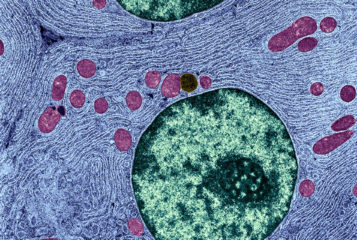Chinese researchers say an IVF technique called pronuclear transfer can safely produce a viable pregnancy.
Researchers from Sun Yat-Sen University of Medical Science in Guangzhou, China, and colleagues from New Hope Fertility Center in New York published their results in Reproductive Biomedicine Online, 13 years after they had reported them at the 2003 annual meeting of the American Society for Reproductive Medicine (ASRM).
Dr John Zhang, the first author of the study, told The Independent that he thought they went public 'too soon' in 2003, and decided not to publish following subsequent negative press and public attention. 'I think some of my team members were so eager to be famous. They wanted to let the whole world know,' he said.
The researchers reported the case of a 30-year-old woman who had two failed cycles of IVF in which all her embryos stopped developing at the two-cell stage. Repeated arrests of an entire set of embryos can indicate problems with eggs. On the third IVF cycle, the researchers performed pronuclear transfer, also known as mitochondrial donation IVF, by moving the nucleus of the woman's fertilised eggs into eggs obtained from a donor, whose nucleus has been removed.
Dr Zhang said the technique they used was 'almost identical' to one proposed by a team of experts at Newcastle University. The procedure resulted in the formation of seven zygotes, five of which were transferred into the woman's uterus and resulted in a triplet pregnancy.
The researchers say they were able to confirm that the fetuses had a normal set of chromosomes and a genetic fingerprint matching that of their mother. Furthermore, the mitochondrial DNA of the fetuses was identical to that of the donor, with no detection of mitochondrial DNA from the mother. They concluded that 'a potentially viable pregnancy with normal karyotype can be achieved through pronuclear transfer'.
However, the pregnancy did not reach full term and the fetuses were lost. There are no micrographs of the nuclear transplantation procedure, and none of the patient's zygotes were kept in culture as a control to the reconstituted zygotes.
A recent change in UK law has made it the only country in the world where mitochondrial donation has been legislated for. Currently it may only be used to avoid mitochondrial disease, and only under licence from the Human Fertilisation and Embryology Authority (HFEA). The Chinese researchers say they are publishing now in the hope that their results will encourage the HFEA to issue a licence.
Dr Jacques Cohen, director of Tyho-Galileo Research Laboratories, together with Dr Henry Malter, director of Laboratories at Fertility Center of the Carolinas, wrote in a commentary accompanying the article that there were many unanswered questions about the case, including 'the review and ethics approval process at Sun-Yat Sen University' and the cause of the demise of the fetuses.








Leave a Reply
You must be logged in to post a comment.